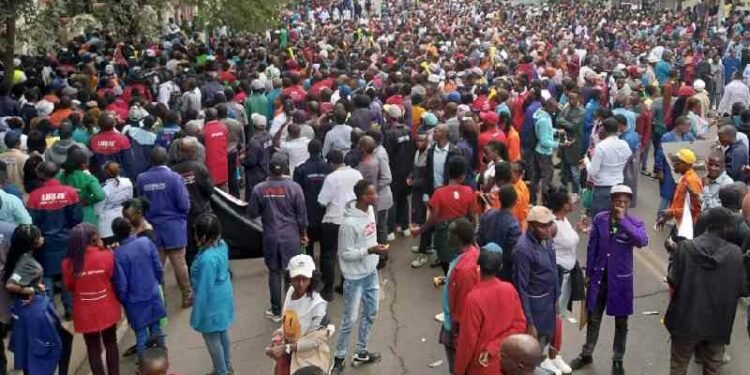Kathmandu: Hundreds of traders in the Kenyan capital Nairobi took to the streets to protest what they called China’s takeover of their businesses.
The demonstration led to running battles between the traders and police, who tried to disperse them.
The traders who came from various markets in Nairobi, including Dubois Street, Gikomba, and Nyamakima, marched to the office of Deputy President Rigathi Gachagua while blowing whistles and trumpets and chanting slogans.
“What we want is sanity in the business. The Chinese have flooded the market, selling cheaper products, some of which are very substandard,” Purity Njeri, a trader, told Anadolu, adding that “we don’t have any business now to do.”
In recent years, the Kenyan government has worked closely with China to boost trade and investment between the two countries.
The influx of Chinese retailers into the Kenyan market, however, has become a point of contention, with many local traders feeling left out and marginalized, Anadolu reported.
The traders say they will continue to protest until their concerns are addressed and their businesses are protected.
Samuel Mureithi, another trader, lamented that the majority of them are small-scale traders who cannot compete with Chinese companies.
“We are small-scale traders with small shops… they have big shops where they have invested a lot of money. This kind of competition is not fair,” Mureithi said, adding that “it is like comparing a mouse to an elephant.”
The traders claim that Chinese retailers have infiltrated the Kenyan market, causing local traders to lose business. They accuse Chinese retailers of selling goods at lower prices, undercutting local traders and making it difficult for them to compete.

The protest brought traffic to a standstill on the busy Harambee Avenue, just outside the deputy president’s office building.
The traders demanded an audience with the deputy president to air their grievances and seek protection for their businesses.
The government has promised to address the traders’ concerns, and on Wednesday, the deputy president will meet with their representatives.
Thamel facing the same fate
Thamel, in Kathmandu, the tourism job, sooner or later is facing the same fate as Kenya. Although the traders here in Thamel have not protested yet, they are being beaten by the Chinese traders. The flourishing of the Chinese trade in Thamel has worried the local traders.
Chinese businessmen have been flocking to Thamel, Kathmandu’s business center, for the past few years and this has dampened the morale of Nepali businessmen.
According to local businessmen, until a decade ago, all businesses here had Nepali and English characters on their hoarding boards, now Chinese characters have also been added.
Chinese investment is not limited to restaurants and hotels but is also expanding into cargo and travel agencies. No official details are available from any agency on Chinese-invested businesses.
The Chinese are especially investing in restaurants and those restaurants are targeting tourists from China. There are many Chinese investment and management restaurants in the Jyatha area.
The growth of Chinese businessmen has also started to be seen in Satghumti and Kshetrapati. The interest of the Chinese has also started in the health clinic. The number of such centers that are treated with the acupuncture method has been increasing recently.
Nepali businessmen express their concern that the originality of Thamel, which has been protected for years, is under threat due to increased Chinese investment.
A complex in Jyatha is named China Town. Most of the businessmen in the complex are Chinese. The Chinese have also built gates of Chinese art in that area. They are trying to give a glimpse of the Chinese market in Thamel.





















